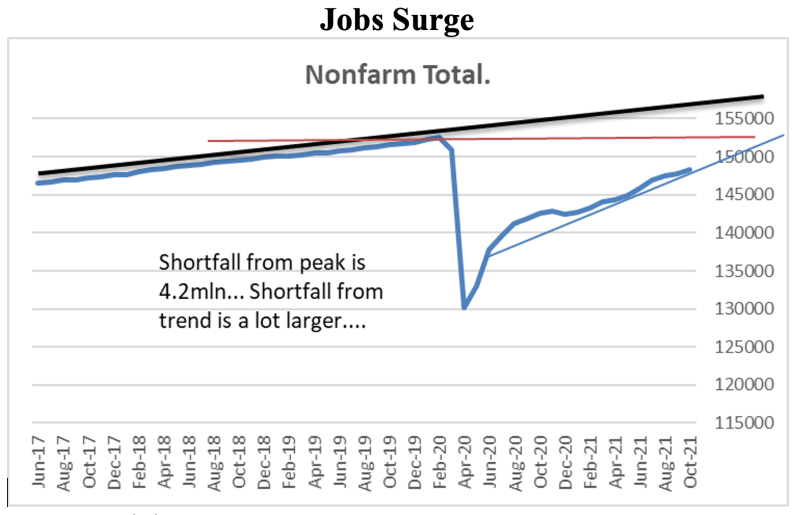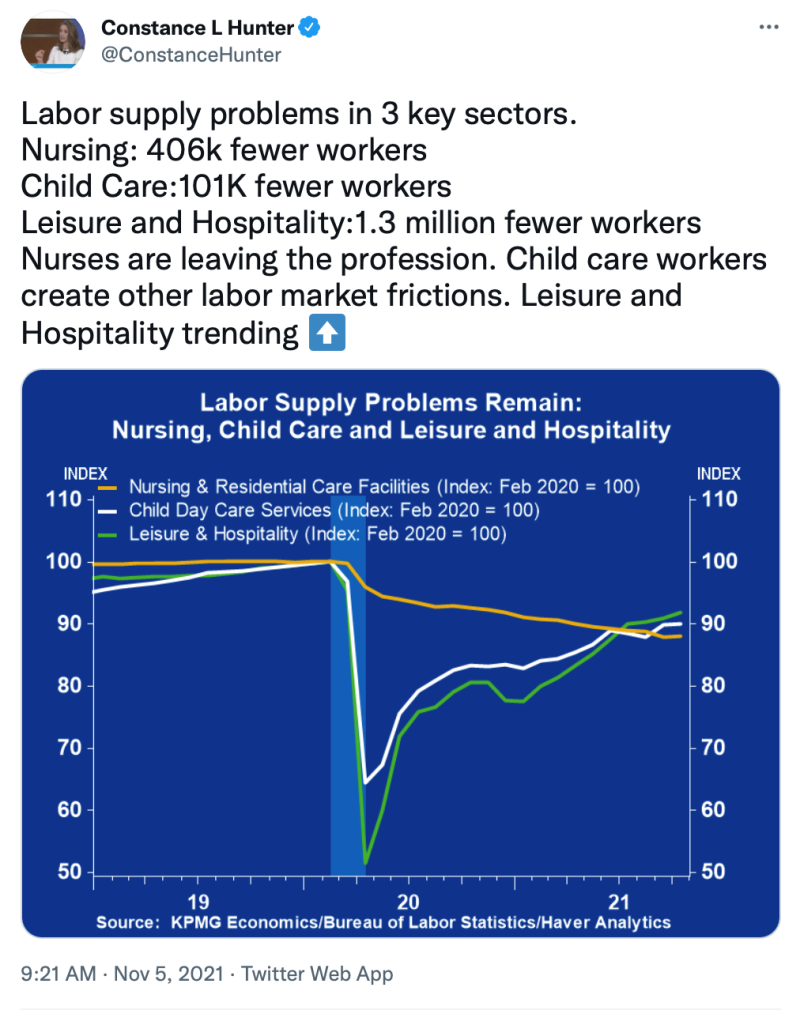My friend and fisherwoman Danielle DiMartino Booth opened the November 15 issue of her Daily Feather letter with this summary: “The record 4.3 million U.S. workers who quit in September total 3.0% of total employment.” She added, “Though off a record high 7%, job openings still remain at an extraordinarily high 6.6% of total employment.” Danielle then dug more deeply into the macroeconomic sectors such as hospitality, leisure, and manufacturing. For more about Danielle and a subscription to the Daily Feather, please see https://quillintelligence.com.

My friend Bob Brusca of FAO Economics observed in a November 5 email to members of his EcoResearchFAOEcon Google Group that today’s remaining employment shortfall is best understood in relation to the jobs trend prior to the pandemic rather than employment numbers just before COVID-19 swept across the globe. Bob wrote, “Upward revisions are much talked about but are small potatoes. Lots of graphics draw the red line (almost there!); few draw the heavy black line (long way to go).” We’d like to thank Bob for giving us permission to share the chart below with our readers.

Today, we would like to focus this Thanksgiving Week missive on healthcare employment and specifically on nurses. We begin with a set of bullets and follow with a list of readings and data sources. Readers who wish to delve into this issue of a nursing shortage will need an hour to cover all the material. (If you don’t have the time, the bullets will help you see how dire circumstances are in the United States.) If you have time for only one link, we ask that you read Rayna LeTourneau’s writing on nurses, immediately following the bullets below.
These bullets are extracted from selected items in the reading list. In case citations are needed by a reader, they can be found in the list.
1. In the United States, total healthcare employment is about 14% of the American workforce. Within that healthcare cohort, the largest single professional category is nursing.
2. There are over 4 million working nurses in the US. There are over 1 million unfilled nursing positions. So when you look at the 7 million job openings macro total in the JOLTS report, please remember that one out of seven of those openings is an unfilled nursing position.
3. Nearly every hospital and health facility in the country is shorthanded nurses and nursing staff. In some hospitals, the nursing shortage is so severe that it is restricting the ability of treatment.
4. Nurses are leaving their profession or retiring earlier than anticipated for various reasons, but COVID burnout and COVID risk are among the most prevalent and most intense reasons.
5. Some state governments have actually cut the budgets of university nursing schools.
6. There is an ongoing controversy about vaccination of nurses. Policy about vaccination varies throughout the country, with no consistency.
7. Hiring of nurses has become an inter-institutional bidding war, with signing bonuses for some specialty nursing positions now reaching $40,000 in some parts of the country.
8. Impediments to immigration have hurt recruitment of nurses from foreign countries.
Here’s a list of citations and references for those who wish to dig deeper into the nursing shortage and related impacts and issues. We will start with a contribution by Rayna Letourneau, Assistant Professor of Nursing at the University of South Florida, with whom we are working on a philanthropic program to advance the training of nursing students and introduce them to the Sarasota Memorial Hospital system with a university-to-hospital preceptor connection. Please note that it took philanthropy and community charity to put that program concept into action. Here’s Rayna, writing for The Conversation: “Nurses are leaving the profession, and replacing them won’t be easy,” https://theconversation.com/nurses-are-leaving-the-profession-and-replacing-them-wont-be-easy-166325.
Economist Constance Hunter, a fishing camper and longtime friend, tweeted this chart tracking the exodus of nurses.

(https://twitter.com/ConstanceHunter/status/1456612586171084810?s=20)
Surveys of nurses’ morale and intentions are not encouraging. It’s worth the time to dive into the details: “Half of nurses said they're thinking of quitting the profession within 2 years in a survey. Higher pay and better staffing could convince them to stay,” https://www.businessinsider.com/nurse-shortage-labor-quit-healthcare-hospital-jobs-employment-shiftmed-survey-2021-10
Because so many seriously ill COVID patients go on to lose their lives despite all nurses and doctors can do, caring for COVID patients means seeing far too many deaths and helping too few to get better. That’s a demoralizing proposition for nurses who were drawn to the profession to help people get better. Read “Why Health-Care Workers Are Quitting in Droves” via Apple News athttps://apple.news/AYKKe04YdQ1azmBKeDv8KEA or at The Atlantic, https://www.theatlantic.com/health/archive/2021/11/the-mass-exodus-of-americas-health-care-workers/620713/.
One bright spot in an otherwise deeply troubling picture is increasing interest in nursing programs: “Nurses Are Quitting in Droves, but Schools Report Higher Program Enrollment,” https://www.newsweek.com/nurses-are-quitting-droves-schools-report-higher-program-enrollment-1639094. Philanthropy has a role in scholarships; we’re working on that one in Sarasota.
An op-ed in the Washington Post explores the traumas that are inducing some nurses to leave their jobs. Vaccine resistance applies to only 12% of them, according to a recent survey by the American Nurses Association: “Covid-19 is taking a terrible toll on nurses. They deserve much more help,” https://www.washingtonpost.com/opinions/2021/11/15/covid-19-is-taking-terrible-toll-nurses-they-deserve-much-more-help/.
Some nurses who are fearful of the COVID vaccinations are leaving positions where vaccination is mandated or will be mandated. Like the rest of the population, some have fallen victim to rampant vaccine misinformation and disinformation, and that is especially unfortunate. See “Amid Nursing Shortage, Hospital CEO Says Vaccine Mandates Can Deter Staff,”https://www.npr.org/2021/09/25/1040718322/amid-nursing-shortage-hospital-ceo-says-vaccine-mandates-can-deter-staff
Assuming that mobility is not an issue for them, unvaccinated nurses who are vaccine hesitant may migrate to jobs in states without vaccine mandates. Vaccinated nurses who have mobility, on the other hand, may respond to offers of higher pay in states where they meet the vaccination requirement.
The divide in healthcare providers thus becomes more acute and extreme. Citizens who need care and who live in the states where vaccinations are not mandated for healthcare workers encounter more unvaccinated nurses, whereas citizens who live in states where healthcare workers must be vaccinated incur less infection risk when they seek medical care. The obvious result over time is that those citizens in the states lacking vaccination requirements are more likely to get COVID in healthcare settings than are their counterparts in states who mandate COVID vaccinations for healthcare workers. Healthcare providers may have greater mobility than the local citizen who doesn’t think about mobility and is usually treated in the local hospital or facility.
Because nurses are also trusted sources of information for patients, the National Council of State Boards of Nursing (NCSBN) has issued a policy statement explaining that nurses who spread flawed information about COVID, masking, or vaccines can be subject to losing their nursing licenses (“Policy Statement: Dissemination of Non-scientific and Misleading COVID-19 Information by Nurses,”https://www.ncsbn.org/PolicyBriefDisseminationofCOVID19Info.pdf).
Hospitals are countering the problem of nursing shortages by offering higher salaries and taking other innovative measures. See “Nurse Salaries Rise as Demand for Their Services Soars During Covid-19 Pandemic,” https://www.wsj.com/articles/nurse-salaries-rise-as-demand-for-their-services-soars-during-covid-19-pandemic-11637145000, and “Hospitals innovate amid dire nursing shortages,”https://www.aamc.org/news-insights/hospitals-innovate-amid-dire-nursing-shortages.
The shortage of nurses is not just a logistical problem for hospitals. It is also a life and death matter for patients. Hospital strain caused by COVID surges results in tens of thousands of excess deaths from all causes, not just COVID. Shortages of nurses only exacerbate that strain on the system and magnify the stress on the nurses who continue to shoulder the load. A recent study published in the Morbidity and Mortality Weekly Report quantifies the impact: “Full ICUs amid COVID surges could lead to thousands of extra deaths,” https://www.cidrap.umn.edu/news-perspective/2021/11/full-icus-amid-covid-surges-could-lead-thousands-extra-deaths.
David R. Kotok
Chairman and Chief Investment Officer
Email | Bio
Links to other websites or electronic media controlled or offered by Third-Parties (non-affiliates of Cumberland Advisors) are provided only as a reference and courtesy to our users. Cumberland Advisors has no control over such websites, does not recommend or endorse any opinions, ideas, products, information, or content of such sites, and makes no warranties as to the accuracy, completeness, reliability or suitability of their content. Cumberland Advisors hereby disclaims liability for any information, materials, products or services posted or offered at any of the Third-Party websites. The Third-Party may have a privacy and/or security policy different from that of Cumberland Advisors. Therefore, please refer to the specific privacy and security policies of the Third-Party when accessing their websites.
Cumberland Advisors Market Commentaries offer insights and analysis on upcoming, important economic issues that potentially impact global financial markets. Our team shares their thinking on global economic developments, market news and other factors that often influence investment opportunities and strategies.

